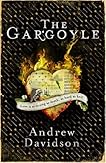 The Gargoyle by Andrew Davidson
The Gargoyle by Andrew DavidsonMy review
rating: 4 of 5 stars
The Gargoyle is an intriguing and intelligent novel that I couldn't put down, despite occasional annoyance with the overly-flowery language, the momentum being spoiled when interesting sections ended too soon (and believe me, parts are simply stunning, particularly Dante's hell as a dream), or when the prose got lumpy.
The book's nameless narrator is horrifically burned in a car accident, after a hallucination distracts him and causes him to drive off a cliff. The story begins with graphic descriptions of his treatment for burns, including very clinical descriptions which sound as though they've been lifted straight from the pages of a medical journal. We learn that he was a porn star in his pre-accident life, and led a debauched and selfish lifestyle. Not only is he now disfigured and in constant pain, but he also lost his penis in the accident, leaving him with no chance of a return to his old life style.
Giving up all hope, he starts to fantasise about an elaborate suicide plan he'll undertake as soon as he is well enough to leave the hospital. But he soon forgets it when a mysterious woman named Marianne Engel starts visiting. She claims to have known him in previous lives, and tells him a series of tales about how they met, and the ways they died, whilst nursing him.
>She turns out to be a sculptor who specialises in gargoyles, but also a former psychiatric patient, with either suspected schizophrenia or bipolar disorder. I found it unbelievable that after so much apparent treatment and time spent on the wards, her doctors were unable to determine which if either she had, given they are characterised by different symptoms.
The main bulk of the stories Marianne tells concern her life as a nun and her translation of Dante's Inferno, which was supposedly brought to her originally by our now-monstrous hero. These stories, presented in the form of first person chapters, are more interesting than the present-day narrative. This left me wondering why Davidson didn't use these as a full novel, especially as he'd obviously gone to some lengths with his research.
The full-on disclosure of the narrator's background points to a redemption story early on. However, I was fascinated, and found the opening similar in tone to Chuck Palahniuk's Invisible Monsters. The style is somewhat different from Palahniuk's, and would have delivered a harder emotional hit had it been a touch less romanticised. I found the obvious conclusion a let down, but because of the circular nature of the plot and the 'morality tale' feel, it couldn't go anywhere else at the end of its magical and inspired journey.
I felt physically repulsed throughout the book, but as a reader who likes it raw I didn't find this objectionable. Despite containing strong elements of Fantasy and Horror, The Gargoyle is probably best placed with Modern Fiction. I'd strongly recommend it as a good example of a mainstream cross-over novel. The intertextual element renewed my interest in Dante's Inferno and inspired me to hunt down a copy. I see it as no bad thing that this book could introduce new readers to such an important poem, although I suspect others may feel that using it as a plot device to such an extent is a rip off.
Although The Gargoyle is blatant and slightly pretentious, Davies still manages to pull off a richly woven, bizarre love story that's not for the squeamish.
View all my reviews.













